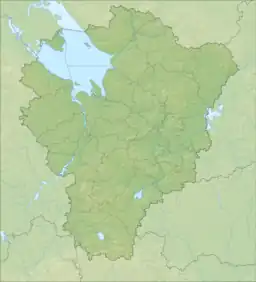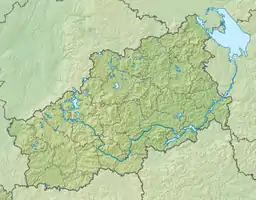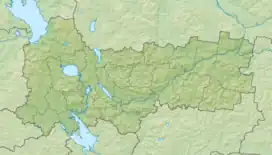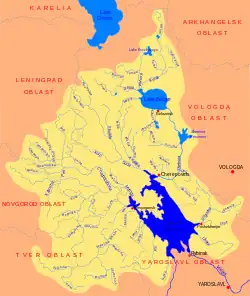Rybinsk Reservoir
Rybinsk Reservoir (Рыбинское водохранилище, IPA: [ˈrɨbʲɪnskəɪ vədəxrɐˈnʲilʲɪɕə]), informally called the Rybinsk Sea, is a water reservoir on the Volga River and its tributaries Sheksna and Mologa, formed by Rybinsk Hydroelectric Station dam, located in the Tver, Vologda, and Yaroslavl Oblasts. At the time of its construction, it was the largest man-made body of water on Earth.[1] It is the northernmost point of the Volga. The Volga–Baltic Waterway starts from there. The principal ports are Cherepovets in Vologda Oblast and Vesyegonsk in Tver Oblast.
| Rybinsk Reservoir | |
|---|---|
 The lake in winter | |
 Rybinsk Reservoir  Rybinsk Reservoir  Rybinsk Reservoir .jpg.webp) Rybinsk Reservoir | |
| Coordinates | 58°22′N 38°26′E |
| Type | Hydroelectric reservoir |
| Primary inflows | Volga, Sheksna, Mologa |
| Basin countries | Russia |
| Surface area | 4,580 km2 (1,770 sq mi) |
| Average depth | 5.6 m (18 ft) |
| Max. depth | 30 m (98 ft) |
| Water volume | 25.4 km3 (6.1 cu mi) |
| Surface elevation | 102.4 m (336 ft) |
| Settlements | Cherepovets Vesyegonsk |

The construction of the dam in Rybinsk started in 1935. The filling of the reservoir started on April 14, 1941, and continued until 1947. Some 150,000 people had to be resettled elsewhere, and the historic town of Mologa in Yaroslavl Oblast along with 663 villages have completely disappeared under water. Today the dam is less important for hydroelectric power supply (output is 346 MW) than it used to be.
References
- Paul R. Josephson. Industrialized Nature: Brute Force Technology and the Transformation of the Natural World. Island Press, 2002. ISBN 1-55963-777-3. Page 31.
External links
- Detailed map of the reservoir (in Russian)
- Webpage of the Leushino Monastery, now submerged under the waters of the Rybinsk Sea (in Russian)



